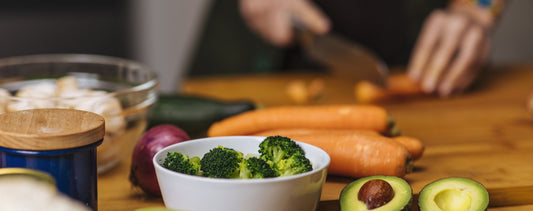Fermented foods are receiving quite a buzz these days. Everything related to gut health is seen more on health and nutrition blogs and found on grocery store shelves. But will fermented foods’ benefits help you?
Digestive issues can include things like constipation, diarrhea, bloating, gas, or diagnosed conditions like irritable bowel syndrome (IBS) and H. pylori infections. Living with constant bloating or gas does not sound fun, so if you can improve your digestion simply by the consumption of fermented foods, what are you waiting for?
Let’s take a look at these five fermented foods that you should introduce to your diet to help boost your digestion.
Kombucha is simple to consume because it’s just a drink that can be found in most grocery stores. It’s usually found in the refrigerated section because it contains live probiotics. It comes in many different flavors on grocery store shelves or you can also learn how to make your own if you search the internet!
Like all fermented foods, sauerkraut contains probiotics that boost the digestive system. However, sauerkraut is special in the sense that it contains multiple different strains of probiotics. One study found 28 strains of bacteria in sauerkraut. This is important because different strains provide defenses against bad bacteria, so the more strains fermented food has, the more health benefits it will carry.
Sauerkraut—fermented foods on the whole, actually—also contains different enzymes that help the digestive system break down food so the body can digest things more efficiently. This will keep the metabolism from slowing down and boost the digestive system in sum. Because fresh, raw sauerkraut provides all the benefits, it’s important to read labels when purchasing it at the store. Always look for the word “raw.” A few brands that sell raw sauerkraut are Farmhouse Culture, Sonoma Brinery, Wildbrine, Bubbies, and Pickled Planet. You can also make homemade sauerkraut in your very own kitchen.
Once the fermenting process is complete, kefir has the consistency of a thin yogurt and a tart flavor. Because it’s fermented, it carries probiotics, which means lots of benefits for the digestive system! It contains many different strains of yeasts and bacteria and, as mentioned before with sauerkraut, the more strains there are, the more benefits—like killing off harmful bacteria in the gut and promoting the growth of good bacteria that help resolve issues like diarrhea, constipation, gas, and bloating.
So with the probiotic benefits of the fermentation and added ingredients in kimchi, it’s a digestive system’s best friend! The flavor is potent and an acquired taste, so don’t expect to love it right away. But once you get used to the flavor and texture, it’s amazing to have on a daily basis.
But what about the digestive benefits? Yogurt provides beneficial bacteria for the gut, but most yogurt is pasteurized, which removes a lot of the medicinal properties. When purchasing yogurt, look for products that have added probiotics to ensure you are getting the beneficial bacteria that will improve digestive health.
Now that you know a handful of fermented foods to help improve your digestion, it’s time to start incorporating them into your diet! Here are a few ideas for you:
*Editor’s Note: The information in this article is intended for your educational use only and is not a substitute for professional medical advice, diagnosis, or treatment. Always seek the advice of your physician or other qualified health providers with any questions you may have regarding a medical condition and before undertaking any diet, supplement, fitness, or other health programs.
What Are Fermented Foods?
Let’s start at the beginning. Fermented foods are foods that have undergone the fermentation process. Fermentation is a process that uses bacteria or yeast to break down sugars. Fermenting was brought about originally to keep fresh food from spoiling so quickly, but once the health benefits of fermentation were realized, it became much more than a food saver! This process preserves foods but also increases the number of beneficial bacteria in your digestive system. Beneficial bacteria, also known as probiotics, have been shown to be helpful for not only the prevention of digestive issues but also the treatment of them.Digestive issues can include things like constipation, diarrhea, bloating, gas, or diagnosed conditions like irritable bowel syndrome (IBS) and H. pylori infections. Living with constant bloating or gas does not sound fun, so if you can improve your digestion simply by the consumption of fermented foods, what are you waiting for?
Let’s take a look at these five fermented foods that you should introduce to your diet to help boost your digestion.
1. Kombucha
Kombucha is a popular drink. It’s a fermented tea that tastes fizzy and tart. Because of the fermentation, it contains the beneficial bacteria that act as probiotics in the gut. Evidence has shown that kombucha has antimicrobial properties to it that fights off bad bacteria like E. coli. The ability to kill off harmful microorganisms, especially in the gut, helps the digestive system function more regularly and avoid symptoms of inflammation related to gut infections like diarrhea, gas, and bloating.Kombucha is simple to consume because it’s just a drink that can be found in most grocery stores. It’s usually found in the refrigerated section because it contains live probiotics. It comes in many different flavors on grocery store shelves or you can also learn how to make your own if you search the internet!
2. Sauerkraut
Sauerkraut is a fermented cabbage that boosts the health benefits of regular fresh cabbage. This isn’t the soggy sauerkraut you see on ballpark dogs or sausages. Think fresh, raw sauerkraut that has all the digestive benefits.Like all fermented foods, sauerkraut contains probiotics that boost the digestive system. However, sauerkraut is special in the sense that it contains multiple different strains of probiotics. One study found 28 strains of bacteria in sauerkraut. This is important because different strains provide defenses against bad bacteria, so the more strains fermented food has, the more health benefits it will carry.
Sauerkraut—fermented foods on the whole, actually—also contains different enzymes that help the digestive system break down food so the body can digest things more efficiently. This will keep the metabolism from slowing down and boost the digestive system in sum. Because fresh, raw sauerkraut provides all the benefits, it’s important to read labels when purchasing it at the store. Always look for the word “raw.” A few brands that sell raw sauerkraut are Farmhouse Culture, Sonoma Brinery, Wildbrine, Bubbies, and Pickled Planet. You can also make homemade sauerkraut in your very own kitchen.
3. Kefir
Have you heard of kefir? It’s not commonly known, but in the health community, it’s known for its powerful benefits to the digestive system. Kefir is a dairy-based fermented drink that’s typically made using either cow’s milk or goat’s milk. But it’s not just fermented milk. It’s made by adding kefir grains to milk, which produces lactic acid and yeast over 24 hours. The kefir grains are what produces the fermentation.Once the fermenting process is complete, kefir has the consistency of a thin yogurt and a tart flavor. Because it’s fermented, it carries probiotics, which means lots of benefits for the digestive system! It contains many different strains of yeasts and bacteria and, as mentioned before with sauerkraut, the more strains there are, the more benefits—like killing off harmful bacteria in the gut and promoting the growth of good bacteria that help resolve issues like diarrhea, constipation, gas, and bloating.
4. Kimchi
Kimchi is like a cousin to sauerkraut. It contains cabbage but also vegetables like radish along with spices like chilis, garlic, and ginger. It’s a kicked-up version of sauerkraut! With the fermented cabbage like sauerkraut, it carries all the same benefits plus some. Because of the spices like chili, garlic, and ginger you get the added benefits of those foods. Research shows that eating those foods can reduce inflammation in the digestive tract.So with the probiotic benefits of the fermentation and added ingredients in kimchi, it’s a digestive system’s best friend! The flavor is potent and an acquired taste, so don’t expect to love it right away. But once you get used to the flavor and texture, it’s amazing to have on a daily basis.
5. Yogurt
Yogurt is the go-to food when doctors tell you to incorporate more probiotic-rich foods. It’s easily accessible and everyone knows what it is! But it’s the least beneficial of these fermented foods because it typically carries the least amount of probiotics. Yogurt is made through the process of fermentation of milk products. And now you can find yogurt from all different sources! Cow’s milk, goat’s milk, almond milk, coconut milk, and even sheep’s milk. It’s an evolving food that’s for sure.But what about the digestive benefits? Yogurt provides beneficial bacteria for the gut, but most yogurt is pasteurized, which removes a lot of the medicinal properties. When purchasing yogurt, look for products that have added probiotics to ensure you are getting the beneficial bacteria that will improve digestive health.
Now that you know a handful of fermented foods to help improve your digestion, it’s time to start incorporating them into your diet! Here are a few ideas for you:
- Drink kombucha as a cold beverage.
- Top your salads with raw sauerkraut.
- Enjoy a smoothie with kefir as an ingredient.
- Serve a small bowl of kimchi with your dinner.
- Eat a bowl of yogurt with fresh berries for breakfast.
*Editor’s Note: The information in this article is intended for your educational use only and is not a substitute for professional medical advice, diagnosis, or treatment. Always seek the advice of your physician or other qualified health providers with any questions you may have regarding a medical condition and before undertaking any diet, supplement, fitness, or other health programs.






















